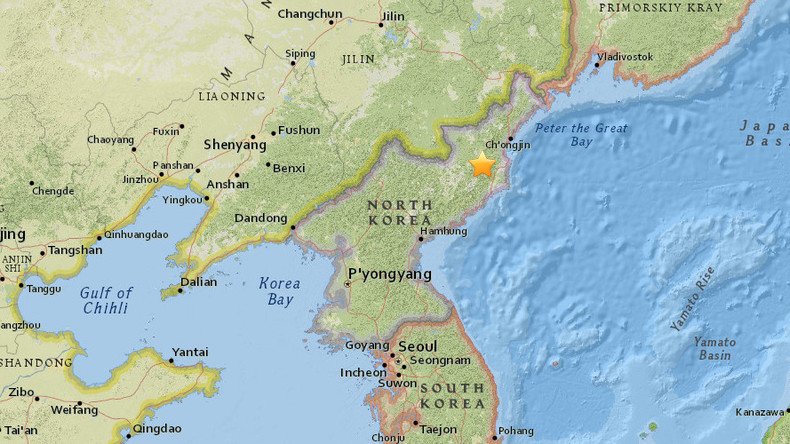China detects 3.4 N. Korea earthquake, fears of new nuclear test unfounded

A magnitude 3.4 earthquake, at a depth of 0 kilometers, was recorded near the Kilju area of North Korea Saturday. Although initial reports suggested it may have been the result of a nuclear test, it seems likely the quake was naturally occurring.
The quake occurred at approximately 08:30 GMT (16:29 local time) Saturday, CENC reported. Kilju is home to the Punggyeri nuclear site, where North Korea's sixth and largest nuclear test was conducted on September 3.
There were conflicting reports as to the strength of the quake, with South Korea’s weather agency reporting that it measured 3.0 on the Richter Scale, as cited by the country’s Yonhap news agency.
Hydrogen bomb vs. atomic bomb: What’s the difference & why does N. Korea crave thermonuclear? https://t.co/9Oxx1694Eipic.twitter.com/wM9T5rETzg
— RT (@RT_com) September 22, 2017
Although Japanese news agency Kyodo reported the quake was caused by a “suspected explosion” at the site, both South Korean and Chinese meteorological services have since dismissed this.
The Korea Meteorological Administration said that “the quake is presumed to have occurred naturally.”
"A sound wave, which is usually generated in the event of an artificial earthquake, was not detected,” an agency official told Yonhap.
CENC also said the tremor wasn’t caused by a nuclear explosion and had characteristics of a natural quake, reported Reuters.
Lassina Zerbo, Executive Secretary of the Nuclear proliferation watchdog the Comprehensive Nuclear-Test-Ban Treaty Organization (CTBTO) also confirmed both the initial temblor, and a second “seismic event,” took place roughly 50km from the site of previously confirmed tests, adding that they were “unlikely Man-made.”
Analysts looking at unusual #seismic activity of a much smaller magnitude in the #DPRK : 23-SEP-2017 08:30 UTC / More details to come!
— Lassina Zerbo (@SinaZerbo) September 23, 2017
Update: Korean Peninsula unusual #seismic activity: LAT=41.36 LON=129.76 mb=3.5
— Lassina Zerbo (@SinaZerbo) September 23, 2017
About 50km from prior tests.#CTBT Analysts investigating.
Two #Seismic Events! 0829UTC & much smaller @ 0443UTC unlikely Man-made! Similar to "collapse" event 8.5 mins after DPRK6! Analysis ongoing pic.twitter.com/DXaDn8TZOf
— Lassina Zerbo (@SinaZerbo) September 23, 2017
To date, the North Korean regime has carried out six nuclear tests, with all previous tests registering above 4.3 on the Richter scale. The most recent, on September 3, was recorded as a 6.3 magnitude quake reports Reuters.
The September 3 test spurred the latest raft of UN sanctions and has raised tensions between the US, its allies, and the North Korean regime.
S.Korean ‘talk of appeasement’ with N.Korea will not work, @realDonaldTrump adds https://t.co/xBclOCkffZ#test#nuclear#hydrogen#bomb
— RT (@RT_com) September 3, 2017
Saturday’s quake follows an escalation of the combative rhetoric between the North Korean and US leaders this week.
Kim Jong-un and President Donald Trump have exchanged a variety of barbs through state media agencies and Twitter respectively, in recent days.
READ MORE: Trump: ‘Madman Kim Jong-un will be tested like never before’












